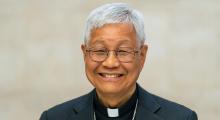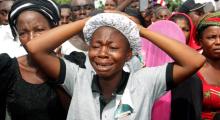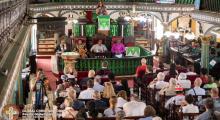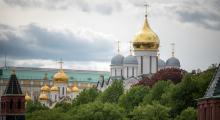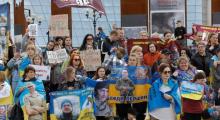Issued by the Catholic Center for Studies and Media - Jordan. Editor-in-chief Fr. Rif'at Bader - موقع أبونا abouna.org
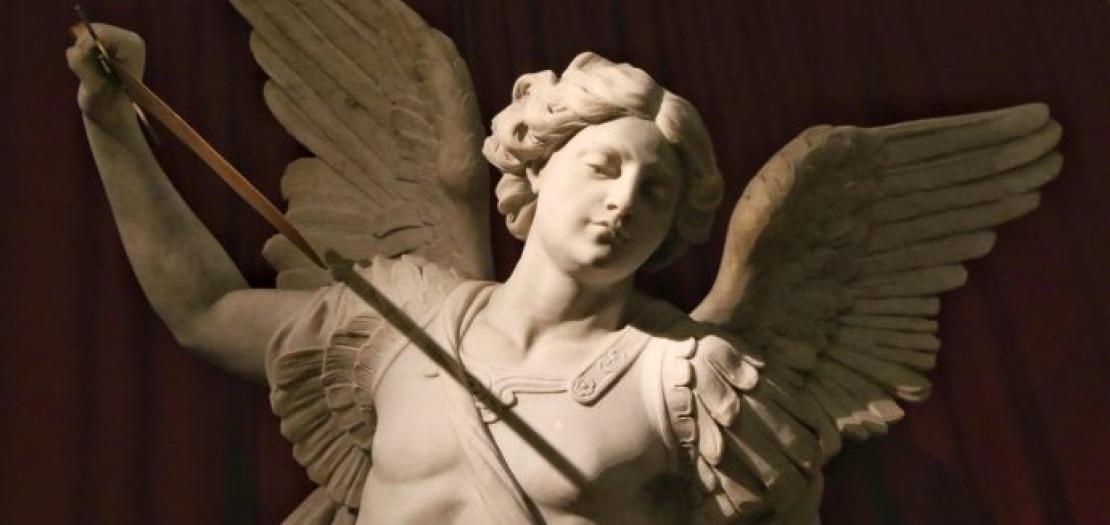
In a move suggesting Pope Francis believes the Church is undergoing “spiritual turbulence,” the pontiff recently asked Catholics to pray daily for the protection of the Church from the devil. The man tasked with coordinating the global campaign says there’s “spiritual combat” under way, and that Satan is at the root of the ongoing crisis in the Church.
Jesuit Father Frédéric Fornos, a Frenchman, president of the Pope’s Worldwide Prayer Network, told Crux that the pontiff asked the faithful to pray the rosary during the month of October because “as everyone perceives, we are in a time of crisis in the Church, with abuses of a sexual nature, but also abuses of power and conscience, and also internal division.”
In addition to the daily praying of the rosary, Francis also requested that faithful add two prayers: An ancient Marian invocation Sub Tuum Praesidium and a prayer to Saint Michael the Archangel “who protects and helps fight against evil,” according to the Book of Revelations.
Fornos spoke with Crux about the campaign and the pope’s reasons behind it on Monday. What follows are excerpts of that conversation.
Crux: How did the decision to ask the faithful around the world to pray the rosary during the month of October, and to conclude with the Marian prayer and the invocation of Saint Michael the Archangel, come to be?
Fornos: I think there are several elements that led to this request. As everyone perceives, we are in a time of crisis in the Church, with abuses of a sexual nature but also abuses of power and conscience, and also internal division. These are things that cause confusion.
Many Catholics wonder what is happening because of the horror of the scandals that seem to never stop, becoming ever deeper, abysmal, and in many countries.
At the same time, we see internal divisions and accusations. Just yesterday and the day before yesterday [for Saturday and Sunday] the Vatican and Cardinal Marc Ouellet responded [to the accusations of Archbishop Carlo Maria Viganò]. These [accusations] have created a lot of confusion.
There are many Catholics who tell me, through the directors of the countries in which we are present, that they distance themselves from the Church, because they say that what they are seeing is not the Church, or who criticize the way the Vatican’s administration is addressing this situation, or people who strongly criticize the pope or the bishops.
We are going through a crisis of trust that clearly discredits the mission of the Church and its message. Although the Church does many very important and good things in the world. I think for example when I was recently in northern Kibu, with nuns who are in very dangerous areas, and every day they risk their lives to provide education, health, or the help they need to the people of the place.
All this is not seen. Faced with scandals, divisions, the only thing you see is that. Everything else, although much is done, is hidden. And although there are thousands of women and men who give their lives in a holy way, everything goes unnoticed because of the crisis of the abuses and other scandals.
Then, to face the strong crisis that exists in the Church, Pope Francis asked for a particular effort from all the People of God, taking advantage of [the fact that] October is the month of the rosary, so that we can ask particularly for the protection of Mary and the Archangel St. Michael, which is the figure of the protector in the Church.
The pope has asked for prayers so that the Church is protected from the devil, but the things you mention seem more man-made than the devil …
I think that by asking for this prayer campaign, Pope Francis is offering us a key to interpret what is going on. Of course there are situations that are man-made, that come from our complicity with power, vanity, pride, wealth, all the passions that can be disordered.
And every day we must take measures to fight against this evil.
But at the same time, Pope Francis tells us that we must go deeper, that there is a root behind the crisis that must not be forgotten. And the spiritual reading that this campaign offers us is that of an ongoing spiritual combat: the pontiff is telling us that we must ask for spiritual protection against the devil, against the one who divides. Diavolos means the one that divides. By telling us this, the pope is telling us what the root of the crisis is.
It is not to justify or say “we have no responsibility whatsoever over the crisis, this is the work of the devil.” Of course not. There is responsibility of the Church and of the members of the Church, of the priests and consecrated persons. But it’s his way of telling us: don’t be mistaken, the origin is much deeper. There is an enemy that is struggling to prevent the Church from giving its message of hope and light to the world, which is the Gospel.
There are many words to refer to a reality - the Adversary, Satan, Father of Lies, the Seducer, the Serpent - which is very difficult to identify but which clearly acts in the world and many times we forget about it. And sometimes we give it a place in our hearts.
By giving us this key of interpretation through the prayer campaign, Pope Francis is telling us that there is a deeper root, that there is a spiritual combat where another, an enemy, is exerting its influence. This means that it pushes us to take a position in this spiritual combat. It invites us to discern what my complicities are: are they with power, with money, with the search for honors, all that is behind clericalism?
Praying the rosary and the prayers the pope asks is a way to take a stand in this battle, so as not to be accomplices of this enemy who tries to drag us into his traps as Saint Ignatius of Loyola says in his spiritual exercises.
What role do laypeople have in this spiritual battle to help the hierarchy and elevate the whole Church, taking responsibility for helping resolve the crisis?
In this campaign the pope speaks not only to the hierarchy, but to the entire People of God. In the letter to the People of God that he released before his trip to Ireland, he said very clearly, when one suffers, all suffer. We are all involved, as a Church, as a community. It is an invitation to all, to mobilize through prayer, with a deeper, more intense prayer.
In this sense, it’s good to remember chapter 5 of the apostolic exhortation Gaudete et exsultate, that has as its title “Spiritual Combat, Vigilance and Discernment.” This apostolic letter is for all the people of God, to show the way of holiness and what hinders the path to holiness.
If we are faithful to Jesus Christ, sooner or later there is a spiritual combat. There are traps of the enemy who does not want us to continue to advance in the way of God, in the way of holiness. That is why this chapter 5 is very useful to all Christians, to all the people of God.
It serves us very much in this campaign, in this time of the Church, to ask ourselves, “Am I aware of this spiritual combat? Am I awake in front of this fight? Do I have the ability to discern in this combat? Or do I run so much in my life, do so many things, have so many worries, that I am not awake to my inner life and to what is happening in my community?”
It is an invitation for all the faithful to be awake to their own spiritual combat and also to the one that is present in their community. A call to vigilance. We are all responsible when we see a friend, or a person, who almost never joins us for dinner, doesn’t go out or who does not pray. Pay attention, that person is going through a difficult time. But many times we are locked in our own lives, living in a bubble, and we forget about others.
Church community becomes almost like a consumption: I go to the Mass, I live this moment with the Lord and with the others, but almost without the others, and I leave as if nothing or no one else mattered, almost without interacting with others, without building a relationship or a community.
How can one be awake and not realize that the brother is in need? That the priest is very tired and nobody helps him? That no family has invited him to dinner for months, and that he’s alone, evening after evening? How can we go one without noticing that there’s another member of the parish who’s normally happy and is suddenly sad or visibly troubled?
We also have a responsibility towards our brothers. We cannot say to the Lord like Cain, “I know not; am I my brother’s keeper?” We have a responsibility as a people of God. Because there is a spiritual combat that concerns us all personally and in a communitarian way.
What has been the reception of the campaign?
We have been told that in many parishes it is being put into practice, and it’s spread in a much faster way than we would have imagined. The fact that October is the month of the rosary helps, as does the fact that it coincides with the Synod of Bishops on young people: Many young people who were praying for the synod have taken this invitation from Francis to pray not only for the synod but for the Church as a whole.
The prayers, however, sometimes take a little explanation, because some have been prayers to Mary and St. Michael Archangel, some have not.
The prayer to Saint Michael, when we know its meaning, it helps us to place ourselves in spiritual combat. If we talk about St. Michael, it means that there is combat. It’s not something you pray as you have a walk in a field of flowers.
The Biblical figure of St. Michael is very interesting: He’s the one who leads God’s army and expels Satan from heaven. Satan pretended to put himself in God’s place, so to pray to him is to fight against pride, which is the root of all evils. It is interesting that the pope invited us to pray to St. Michael Archangel, who is fighting against all our pride, which is the origin of the search for power.
We know that one of the plagues for everything, not only clerical sexual abuse, is clericalism, which is a form of seeking power. When we understand more the meaning of these prayers and the prayer to Mary Mother of God, who gives us her mercy, we understand the spiritual combat in which the community is involved, so as not to let ourselves be dragged into the trap of the enemy and so that we can take position in this combat.


